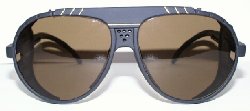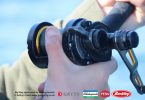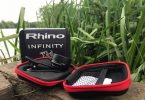 The small package was waiting for me when I got home.
The small package was waiting for me when I got home.
Having passed go, taken a chance and collected the proceeds of a maturing endowment policy, which I had been paying into for years, I had felt entitled to splash out on a few items of tackle which had been on my wish list for quite some time.
However, it was with a degree of some considerable trepidation that I opened the parcel. I had a bad feeling about this particular extravagance.
Long before I became a lure angler, I had started to wear Polaroid glasses. Their trick of almost eliminating surface glare had revealed many watery secrets to me.
Viewed through ordinary glasses, I might glimpse a silver flash, and the surface swirl of fishy activity below. Clipping on Polaroid overclips, would reveal the cloud of daphnia, dancing in the sunlight, the shoal of roach feeding on them, and the jack pike carefully positioning itself for a sudden and deadly strike.
Or perhaps the bloodworm, waving like tentacles on the muddy lake bottom, attracting the attentions of a small group of tench. Or the water snails now growing on the proliferating weed, signalling the end of sport for anglers’ baits, as the golden sided tincas became more pre-occupied with the abundance of natural food.
Occasionally, the bloody things would lead me to near disaster as, walking the mudflats, looking for the casts of lug worm, I’d completely fail to see the hidden pool of salty water, and wade straight into someone’s previous workings, now filled with a foot or so of soft mud, and signed by an unobserved pool.
Having to wear prescription lenses had previously condemned me to clip on Polaroid’s. Trouble was that you then had two surfaces to capture stray glare, and to keep clean. The clips risked damage to the expensive plastic lenses of the prescription glasses, now, due to the ravages of age ,of the even more expensive varifocal variety. And I could never remember where I had left the darn things.
So it was with interest that I read that a company was making prescription polarised glasses. OPTILABS at 109 Stafford Road Croydon, Surrey, CR9 4BB. Tel: 0181 686 5708. Email sales@optilabs.com.
I gave Tony Kerr at Optilabs a call. ‘Just send me your prescription’, he said. So I faxed it off, together with my credit card details. Because my prescription was for varifocals, I had to have a pair measured by my opticians, to make sure that the point of focus was right. I received a pair of glasses for measuring by return of post, took them to my optician, who was happy to make and record the measurements free of charge (according to Optilabs, most opticians will be happy to do this at no cost). I then posted the glasses back to Optilabs for fitting with the prescription lenses.
Now, I was nervous.
 When I had my original varifocals made, the optician had warned that large lenses were to be avoided, as the larger the lens, the more distortion of image would be experienced at the periphery of vision. The lenses of the glasses sent by Optilabs were very large. They also warned me that there were a number of different types of varifocal lense, and the would have no responsibility if the ones supplied by Optilabs proved to be unsuitable.
When I had my original varifocals made, the optician had warned that large lenses were to be avoided, as the larger the lens, the more distortion of image would be experienced at the periphery of vision. The lenses of the glasses sent by Optilabs were very large. They also warned me that there were a number of different types of varifocal lense, and the would have no responsibility if the ones supplied by Optilabs proved to be unsuitable.
Having lenses made by someone I hadn’t even met was a daunting proposition.
I carefully opened the box, unfolded the glasses and prepared myself for disappointment. I slipped the glasses on and looked out of the window. Perfect. I looked down at the hairs on my hand, again perfect focus. I went outside and looked at the clouds. The high contrast, golden lenses cut through the glare and showed the cumulus shapes in perfect and dramatic detail.
They worked even better at the waterside. Watching the lure come back, I could see exactly how it was working. I could see the shoal of roach, move aside as it passed.
 I saw a huge carp gliding beneath the lilies. Eventually, I saw the shape of a jack pike emerge from the weed to snatch at the lure, and it missed!
I saw a huge carp gliding beneath the lilies. Eventually, I saw the shape of a jack pike emerge from the weed to snatch at the lure, and it missed!
These glasses are made for sportsmen, with UV protection, water-resistant lenses, detachable side panels, a strap and a semi-rigid case. My varifocals cost 130 pounds, which is a good bit less than my standard glasses. If you are lucky enough not to need prescription lenses, you can buy a pair of high contrast polarising glasses for around 57 pounds. Standard prescription lenses will be somewhere in between.
As well as using them for fishing, I also find them perfect for driving and for cycling.
Leon Roskilly
3rd September, 1999








